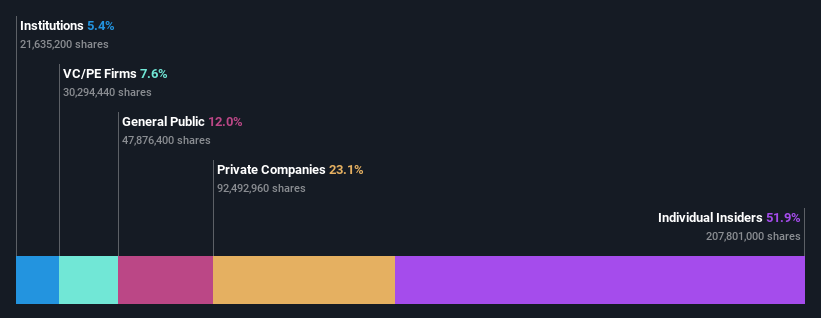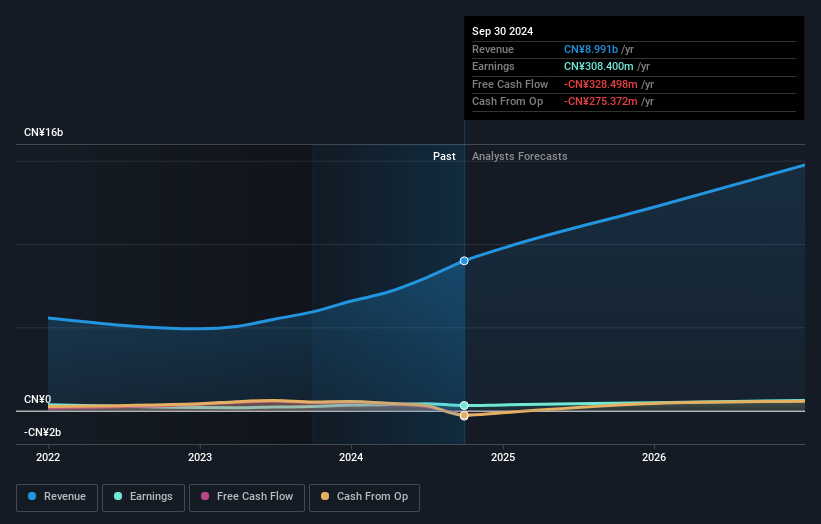- China
- /
- General Merchandise and Department Stores
- /
- SZSE:301381
CEO Wenping Chen, Sailvan Times Co., Ltd.'s (SZSE:301381) largest shareholder sees value of holdings go down 7.5% after recent drop
Key Insights
- Insiders appear to have a vested interest in Sailvan Times' growth, as seen by their sizeable ownership
- A total of 2 investors have a majority stake in the company with 59% ownership
- Using data from analyst forecasts alongside ownership research, one can better assess the future performance of a company
To get a sense of who is truly in control of Sailvan Times Co., Ltd. (SZSE:301381), it is important to understand the ownership structure of the business. We can see that individual insiders own the lion's share in the company with 52% ownership. In other words, the group stands to gain the most (or lose the most) from their investment into the company.
And last week, insiders endured the biggest losses as the stock fell by 7.5%.
In the chart below, we zoom in on the different ownership groups of Sailvan Times.
See our latest analysis for Sailvan Times

What Does The Institutional Ownership Tell Us About Sailvan Times?
Institutions typically measure themselves against a benchmark when reporting to their own investors, so they often become more enthusiastic about a stock once it's included in a major index. We would expect most companies to have some institutions on the register, especially if they are growing.
As you can see, institutional investors have a fair amount of stake in Sailvan Times. This can indicate that the company has a certain degree of credibility in the investment community. However, it is best to be wary of relying on the supposed validation that comes with institutional investors. They too, get it wrong sometimes. It is not uncommon to see a big share price drop if two large institutional investors try to sell out of a stock at the same time. So it is worth checking the past earnings trajectory of Sailvan Times, (below). Of course, keep in mind that there are other factors to consider, too.

Sailvan Times is not owned by hedge funds. With a 37% stake, CEO Wenping Chen is the largest shareholder. Gongqingcheng Zhongteng Venture Capital Partnership Enterprise (Limited Partnership) is the second largest shareholder owning 22% of common stock, and Wenhui Chen holds about 15% of the company stock.
To make our study more interesting, we found that the top 2 shareholders have a majority ownership in the company, meaning that they are powerful enough to influence the decisions of the company.
While it makes sense to study institutional ownership data for a company, it also makes sense to study analyst sentiments to know which way the wind is blowing. Quite a few analysts cover the stock, so you could look into forecast growth quite easily.
Insider Ownership Of Sailvan Times
While the precise definition of an insider can be subjective, almost everyone considers board members to be insiders. Management ultimately answers to the board. However, it is not uncommon for managers to be executive board members, especially if they are a founder or the CEO.
Most consider insider ownership a positive because it can indicate the board is well aligned with other shareholders. However, on some occasions too much power is concentrated within this group.
Our information suggests that insiders own more than half of Sailvan Times Co., Ltd.. This gives them effective control of the company. Insiders own CN¥4.8b worth of shares in the CN¥9.3b company. That's extraordinary! Most would argue this is a positive, showing strong alignment with shareholders. You can click here to see if they have been selling down their stake.
General Public Ownership
With a 12% ownership, the general public, mostly comprising of individual investors, have some degree of sway over Sailvan Times. While this size of ownership may not be enough to sway a policy decision in their favour, they can still make a collective impact on company policies.
Private Equity Ownership
With a stake of 7.6%, private equity firms could influence the Sailvan Times board. Some might like this, because private equity are sometimes activists who hold management accountable. But other times, private equity is selling out, having taking the company public.
Private Company Ownership
It seems that Private Companies own 23%, of the Sailvan Times stock. Private companies may be related parties. Sometimes insiders have an interest in a public company through a holding in a private company, rather than in their own capacity as an individual. While it's hard to draw any broad stroke conclusions, it is worth noting as an area for further research.
Next Steps:
While it is well worth considering the different groups that own a company, there are other factors that are even more important. Be aware that Sailvan Times is showing 2 warning signs in our investment analysis , and 1 of those can't be ignored...
But ultimately it is the future, not the past, that will determine how well the owners of this business will do. Therefore we think it advisable to take a look at this free report showing whether analysts are predicting a brighter future.
NB: Figures in this article are calculated using data from the last twelve months, which refer to the 12-month period ending on the last date of the month the financial statement is dated. This may not be consistent with full year annual report figures.
New: Manage All Your Stock Portfolios in One Place
We've created the ultimate portfolio companion for stock investors, and it's free.
• Connect an unlimited number of Portfolios and see your total in one currency
• Be alerted to new Warning Signs or Risks via email or mobile
• Track the Fair Value of your stocks
Have feedback on this article? Concerned about the content? Get in touch with us directly. Alternatively, email editorial-team (at) simplywallst.com.
This article by Simply Wall St is general in nature. We provide commentary based on historical data and analyst forecasts only using an unbiased methodology and our articles are not intended to be financial advice. It does not constitute a recommendation to buy or sell any stock, and does not take account of your objectives, or your financial situation. We aim to bring you long-term focused analysis driven by fundamental data. Note that our analysis may not factor in the latest price-sensitive company announcements or qualitative material. Simply Wall St has no position in any stocks mentioned.
About SZSE:301381
Sailvan Times
Sells lifestyle products through third-party e-commerce platforms in China and internationally.
Excellent balance sheet and good value.
Market Insights
Community Narratives




